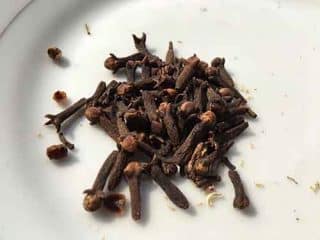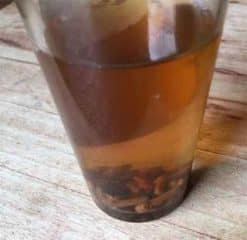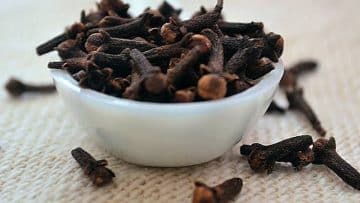Over the years, rumors have it that Cloves helps to tighten the vagina. It is believed that if you soak cloves inside water for 2 to 3 days. The resulting water is then used for vagina wash. They believe this will help tighten the vagina and remove infections and odors.
But the question here is, does this method work?
In this article, we would talk more about this method, find out if it works and if not, talk about the possible alternatives. So follow me, let's do the adventure together.
What Are Cloves
Cloves are the flower buds of the clove tree, an evergreen. They are in both whole and ground forms and can be used to season pot roasts, add flavour to hot beverages, and bring spicy warmth to cookies and cakes.
Cloves are known as sweet and aromatic spices and they have been used in traditional medicine.
Compounds in cloves might have several health benefits, including supporting liver health and helping stabilize blood sugar levels, according to some studies in animals. Cloves are a good source of minerals especially manganese, omega-3 fatty acids, fiber and Vitamins. They're antibacterial, antiseptic, antifungal and analgesic, packed with antioxidants.
 What Is Vaginal Tightening?
What Is Vaginal Tightening?
Vaginal Tightening is the process of tightening the pelvic muscles. This helps to achieve a degree of elasticity of the pelvic floor muscles, thereby increasing tightness.
After childbirth, most women feels it's best they tighten their vaginal so they can feel more sexy and confident, especially when it comes to having sexual intercourse with their partner. For that reason, most women see vaginal tightening as a perfect option.
A tight could increase the pleasure for both you and your partner during sexual intercourse. It is the feeling of those soft, cushiony walls gripping their penis for men. And for the women, it's the sensation of feeling every ridge of their man's penis inside them.
But when the vagina becomes 'loose', then perhaps sex might become a little bit less stimulating. Then this is where vagina tightening comes to play. While there are several ways of achieving this naturally or through exercises (such as yoga and Kegel exercises which have been found to help strengthen pelvic wall muscles and can make you very tight).
Some women however do opt to get it done surgically— either via vaginoplasty or labiaplasty.
[content-egg module=Amazon]
What Causes Vagina Loose?
Vagina loose can be caused by various reasons which we would discuss more about below:
 Does the Menopause cause vaginal looseness?
Does the Menopause cause vaginal looseness?
Some of the causes of vagina loose include the Menopause, high impact sports and weight gain.
Whatever the case may be, a lack of muscle strength, tone and a ‘looser’ vagina can have a deep effect on not only a woman’s relationship life, but her entire life.
Moreover, in most cases, this will cause her to start feeling anxious and this can result into depression because she is no longer able to satisfy her partner sexually, thus inspiring a total lack of self confidence. If a couple has always enjoyed an active sex life and it has taken somewhat of a hit, this can be a devastating blow.
Does Pregnancy and Childbirth Cause Vaginal Looseness?
The short answer is yes. Pregnancy and childbirth, in particular, have a great impact on the body. During childbirth, the pelvic floor, and indeed the vaginal wall, is stretched to the limit. The muscles expand to assist your baby through the birthing canal, which in most cases (unsurprisingly) results in a ‘looser’ vagina.
This is probably just the price you pay to receive the greatest gift in the world as a mother. So it shouldn’t come as a surprise that you will undoubtedly be looser now than you were prior to pregnancy and giving birth. Although, there are many other causation factors to consider when it comes to the loss of vaginal tightness.
40 percent of first-time mothers have no sexual relations for up to 2 years following childbirth. Millions of new mums think that reduced sexual satisfaction is just something that comes with the territory, unaware of the measures that can be taken to treat it. Some women are too embarrassed to broach the topic at all, making it even more difficult for them to find a way out.
Related reading
- 20 Health Benefits of Cloves and Milk and How to Prepare It.
- Samsu Oil: Health Benefits, Side Effects and Reviews
- How to Use Bitter Kola to Last Longer in Bed
- Benefits of Okra to ladies Sexually: Everything you need to know
- 10 Amazing Health Benefits of Aidan Fruits
Does Cloves Water Tighten The Vagina?
There has been little or NO evidence to suggest that cloves help tighten the vagina. However, Cloves have shown to have other benefits. The antiseptic properties of cloves have been confirmed by several studies, clove oil contains the active ingredient eugenol, which is a natural anesthetic. It helps numb and reduce pain. Eugenol also has natural anti-inflammatory properties. A British study found that eugenol is more effective at reducing pain, inflammation, and infection than other types of analgesic.
How to Prepare Clove and Milk
Ingredients
- 1 tbsp Black tea optional
- 2 cloves
- 1½ cup water
- 3 tbsp milk powdered
Instructions
- Fill your pot or kettle with a cup of water
- Add 2 cloves, and if you wish, 1 tablespoon of black tea, or any tea of your choice.
- Let the clove and tea boil for 5 to 7 minutes in high heat
- Make your glass cup half-full with water.
- Add 3 tablespoons of powdered milk to the water and stir.
- Add milk to the boiling clove and continue heating for another 5 minutes
- Strain your Clove and milk/Clove tea into a tea pot
- serve warn and with sugar (optional).
 What Are The Side Effects Of Cloves?
What Are The Side Effects Of Cloves?
Research has shown that clove oil is associated with multiple hazards. It may cause skin, eye, and respiratory irritation, or an allergic reaction on the skin. It is also flammable and could be fatal if it is swallowed and goes into the airway. Cloves may also increase the chance of bleeding or increase the body’s response to warfarin. We however recommend you discuss the use of any herbal products with a medical professional so that they can review potential side effects and interactions.


 What Is Vaginal Tightening?
What Is Vaginal Tightening? Does the Menopause cause vaginal looseness?
Does the Menopause cause vaginal looseness?  What Are The Side Effects Of Cloves?
What Are The Side Effects Of Cloves?